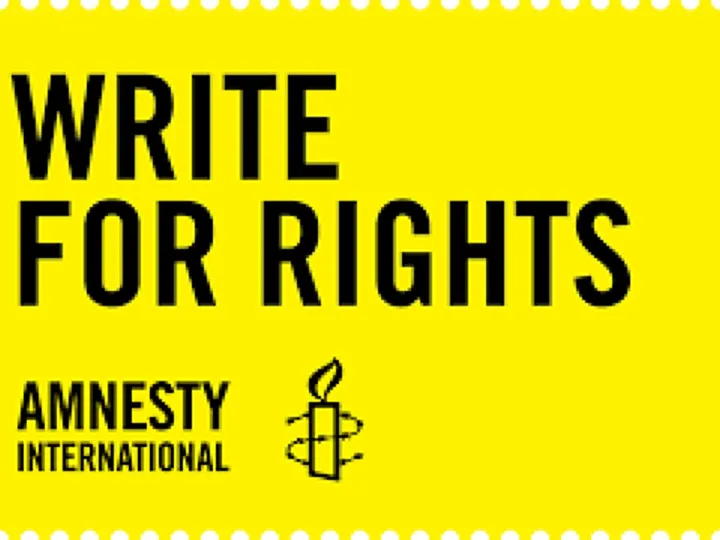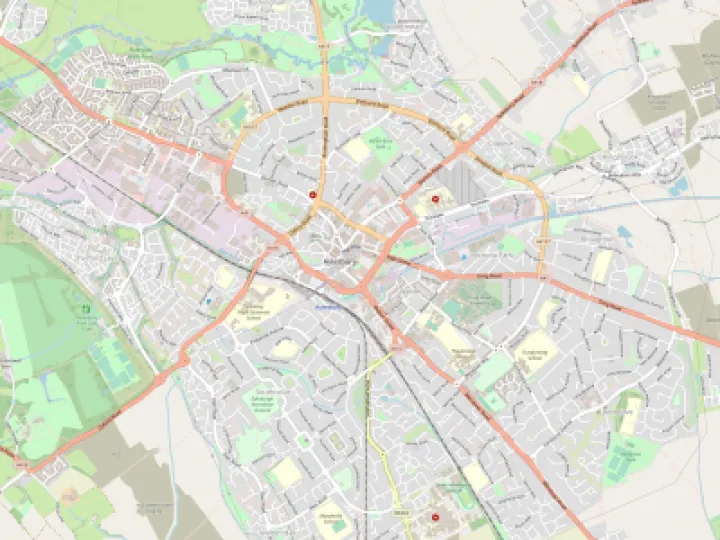Welcome to Amnesty's Write for Rights 2024 letter writing campaign. The campaign features people from around the world, all of whom are connected because their human rights have been violated. Some by their governments, others by the police, or even by big corporations.
Real letters and cards can bring hope to people in the direst of situations; people who've been harassed, threatened and jailed just for who they are and what they do.
When letters arrive in huge numbers, they are also an unmistakable reminder to prison authorities and others that the world is watching.
For every case, there are two types of messages you can write – one to the person we are fighting for, or their family, so they know we will never forget them, and one to the person in authority.
1. Write a message of solidarity. This is where Write for Rights began: writing a card/letter to people who are wrongly punished, to show them that they're not alone and not forgotten by the rest of the world.
2. Write an appeal letter
In a world of petitions, physical post does get noticed! As well as writing to the people experiencing human rights abuses, you can write to the authorities who can bring them justice.
All the details of how to write to authorities are in our campaign booklet.
https://www.amnesty.org/en/documents/act30/8281/2024/en/ or click here
Rather stay online?
If writing letters isn't for you, you can also take action online – see above.
DOES IT WORK?
Yes! Every year, real change happens because of your letters and actions. People wrongfully imprisoned are released. Abusers are brought to justice. And people in prison are treated more humanely. A few words go a long way, for all of us. They can make us feel seen, supported, safe.
Beginning this week, Jennie Torpey will include two people, with their details
and where to send your card/letter.
Your message could make all the difference!
EBNEM KORUR FINCANCI, Türkiye.
At home, Professor ebnem Korur Fincanc enjoys spending time with her cats Simone and Ulula, cooking and listening to music. Beethoven is her favourite composer.
To the world, ebnem is a forensic medicine expert, renowned for her work to eradicate torture. She has contributed to the development of a UN protocol on the investigation of torture, and a handbook on sexual violence for the World Health Organization. Until June 2024, she was the head of the Turkish Medical Association.
ebnem has also continually fought to protect the human rights of people in Türkiye, including their right to freedom of expression. In a bid to silence her and stop her important work, for years the Turkish authorities have subjected ebnem to baseless criminal investigations, detention and prosecutions.
In January 2023, she was convicted for allegedly "making propaganda for a terrorist organization" after she had called for an investigation into allegations that the Turkish military was using chemical weapons in Iraq. ebnem is appealing against her conviction but could be imprisoned for almost two years if her appeal is unsuccessful.
The government is cracking down on people's freedom of expression and putting restrictions on the work of human rights defenders like ebnem. But ebnem refuses to give in to their intimidation. Undeterred by the hostility she faces, she says: "I have never had the habit of bowing to any authority to this day."
SHOW EBNEM THAT YOU SUPPORT HER:
Send your messages of support in a card or letter to show ebnem that you support her in her fight to protect people's rights in Türkiye.
Prof. ebnem Korur Fincanc
c/o Türk Tabipleri Birlii,
GMK Bulvar,
ht. Dan Tunalgil Sk. No: 2/17-23,
06570 Maltepe,
Ankara,
Türkiye.
KYUNG SEOK PARK, South Korea.
Before Kyung Seok Park developed paraplegia following a hang-gliding accident in August 1983, he never thought about the lives of people with disabilities. He was 22 years old and busy studying at university, playing guitar and having fun with friends. When Kyung Seok attempted to live as a person with a disability, he soon found daily life for people with disabilities in South Korea was unacceptably difficult, even dangerous.
His life as an activist began. Representing Solidarity Against Disability Discrimination (SADD), a disability rights movement, Kyung Seok focuses his activism on public transportation. Without measures to eliminate obstacles and barriers to access public transport, people with disabilities are cut off from being able to participate fully in all aspects of life – travelling to a job or school and living independently. Numerous wheelchair users in Seoul have been killed or injured when utilizing unsafe wheelchair lifts at train and subway stations.
Demanding an increase to the public budget for disability rights, in 2021 Kyung Seok and SADD activists began peaceful protests, during which many wheelchair users simultaneously boarded and disembarked subway trains during busy commuting hours. Authorities in Seoul have reacted negatively, including with violence. The protests have been repressed and activists forcibly dragged out of stations by police. Politicians have conducted smear campaigns, painting disability activists as a public nuisance. Seoul Metropolitan Government has filed multiple "blockade lawsuits" against peaceful protesters, further attempting to quash their activism.
Despite being almost strangled by police and Seoul Metro staff during a peaceful protest, and facing multiple lawsuits because of his activism, Kyung Seok continues to fight, declaring: "We refuse to wait any longer. We demand a world where no one is left behind."
SHOW KYUNG SEOK PARK THAT YOU SUPPORT HIS ACTIVISM:
Send your messages of strength and hope in a card or letter, and show Kyung Seok Park and SADD activists that they are valued and respected.
Kyung Seok Park
c/o Solidarity Against Disability Discrimination
5F, 25, Dongsung-gil,
Jongno-gu,
Seoul 03086, Republic of Korea.
Get In Touch
Aylesbury Methodist Church & Centre
Buckingham Street
Aylesbury
Buckinghamshire
HP20 2NQ


